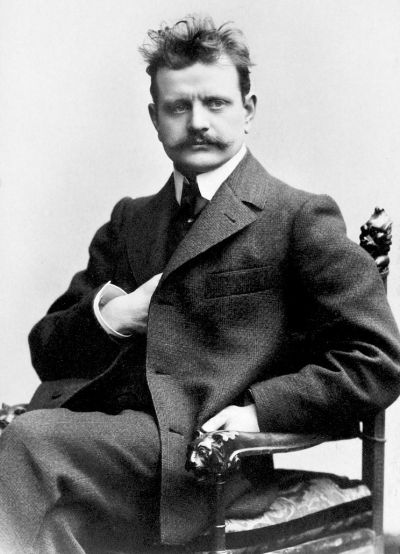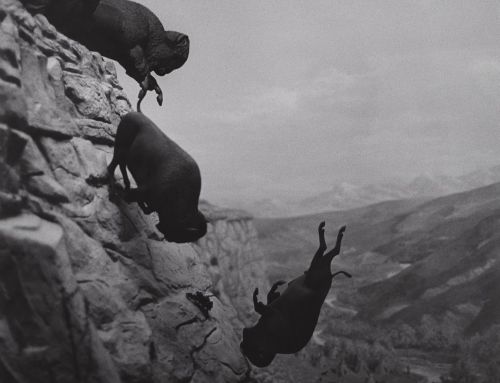
Jean Sibelius famously said “No statue has ever been put up to a critic.” Photographer Daniel Nyblin, Finnish Heritage Agency.
One could be forgiven for not making it far along in The New York Times book critic Dwight Garner’s bloated review of wine writer Ray Isle’s recently released book ‘The World in a Wineglass.’ Garner’s disdain for and lack of interest in the subject matter is immediately apparent to readers with even a passing interest in wine.
That’s never more true than in the first sentence of his review. “Winery owners appear to lead charmed lives,” writes Garner. (It would seem that he has never talked to one.) To the 11,000 some-odd, hard-working U.S. winery owners out there, I assure you, this was not intended as the laugh line it is. Rather, it’s an entryway into Garner’s criticism of an industry he doesn’t know or seem to care to.
Garner’s introduction employs other tired tropes. “Wine people, for professional reasons, are frequently half-potted by 11 in the morning,” he writes without explaining why he thinks this or, even if it were true (it’s not), its relevance. “The hard part is the return to the desk.” I can only speak personally as both a writer and a critic, but I am typically seated at my work chair by 9am each day. Moreover, one has to wonder, “What does any of this have to do with Ray Isle’s book?”
It’s seldom clear throughout Garner’s review. He writes of Pliny the Elder (yawn) and Robert Parker Jr. (bigger yawn). It’s as if Garner opened Wikipedia and searched “wine criticism.”
As with Garner’s other book reviews, this entranceway seems more formulaic than informed, more padded and personally indulgent than profound. As with the rest of his review, one frequently asks “Where is the editor?” If this were a first year college paper, the four introductory paragraphs would have a red marker strikethrough as they are apropos of nothing. We are a full 300+ words in before Garner even mentions the subject at hand.
By the time Garner does turn his attention to Isle’s book, we expect the outcome. Unfortunately for Isle, Garner clearly does not like books of any size, if he even still likes books at all.
In a recent review of ‘Among Friends’ edited by Buz Teacher and Janet Bukovinsky Teacher, Garner complains of the book as “brutalist in size.” Similarly, Garner’s initial assessment of Isle’s book is that it is “elephantine, hernia-inducing.” (Amazon lists it at 3.91 pounds. Garner might want to work on his lower abdominal muscles if that’s a problem for him.) One can imagine Garner criticizing Dickens’ ‘Tale of Two Cities’ as “a book much easier to pick up if only one city’s tale were told.” Melville’s ‘Moby Dick’ would be “monstrously oversized, like the creature he writes about.”
Garner’s writing throughout is often presumptuous, with a lack of self-insight or awareness of overt irony. He criticizes Isle’s repetition in his book, writing “You will learn vastly more than you wished to know about indigenous yeasts and regenerative agriculture and the dirty business of adding sulfates. And then you will learn it all again.”
However, having already described Isle’s book physically, Garner elsewhere proclaims “It’s too heavy,” as if we could have possibly missed his original fat-shaming. There’s a well-worn saying that a book shouldn’t be judged by its cover. Garner, however, is clearly fully comfortable determining a book’s worth by its weight.
Garner continues along these lines with one simile too many, writing, “It’s also too padded, like a student’s term paper. If it were an Easter basket, it would be 95 percent shredded green paper. You must really poke around to find the candy eggs.”
The same must be said of Garner’s review. There are the required quotes excerpted to show the reader that Garner has (apparently) read the book in question. There are the expected yawn-inducing literary references for Garner to prove to his readers, or perhaps himself, that he is well-read. Overall though, it all seems tiresome, tedious, and trite.
Garner writes of the sections of Isle’s book he finds worthwhile “This superb material could fit on two dozen index cards, or about eight of its 706 pages.” He does so with no apparent sense of irony that the same could be said of his 1,300-word review that would be more fitting, generously, at 300 words and, at best, the top line of an index card.
Garner finishes his review writing, “Up with Ray Isle, who has better books in him.” Honestly, it’s not clear if Garner has better reviews in him or not.
In the Christmas TV classic ‘Rudolph the Red-nosed Reindeer,’ Hermey, the misfit elf, opines to the elf foreman, “I’m not happy in my work.” One gets the same impression from Garner’s reviews. They are often, like this, labored, excruciating reads. Unfortunately, Garner seems to want to inflict similar pain not just onto his readers but also onto those whose books he is tasked with reviewing.
Perhaps I should have more sympathy. For any critic, love becomes work, work becomes a chore, and one can easily become disillusioned if continuing down that path too long without returning to the love. But as a critic for The New York Times, Garner should hold himself – and should surely be held by his editors – to a higher standard. That standard, any standard really, is sorely lacking in his review.
For a critic, having an opinion can be mistaken for having an informed one. No one should make that mistake with Garner’s review of Ray Isle’s book. Ultimately, any piece of criticism will be evaluated by its benefit to readers. In Garner’s review of ‘The World in a Wineglass,’ there is none.
Northwest Wine Report is wholly subscriber funded. Please subscribe to support continued independent content and reviews on this site.
To receive articles via email, click here.







Well down, Sean
He sounds a right pompous twit.
May have to purchase the book out of spite for the reviewer.
Hilarious Sean! You gave him a literary ass whupin’! The NYTimes is a bloated mess that gained it’s heft from the monstrous egos of their staff, Paul Krugman included.
Maybe you will consider following up your review of the reviewer by writing your own review of the book.
Well said, Sean. I am a big fan of Ray and his writing. This review was just awful.
Here is my review of your review of the reviewer of the author of the book:
He goes on for quite a while, possibly for ironic effect. It’s hard to tell for sure. In any case it’s a bit of a slog.
Dave, brevity has many fathers but irony’s mother only has a twin.
Well it is 11:14 AM and I have had 6 1/2 oz. of wine. With lunch, since breakfast was 5 hours ago.
After doing emails it’s back outside till dark.
Paul Vandenberg
Paradisos del Sol Winery and Organic Vineyard
Well done Sean! Leave it to a Pacific Northwest Mossback to put an opprobrious New York critic in his place.
And BTW, I do hope your open, honest acknowledgement of where NWR stands in terms of subscribers and revenues has gotten wine consumer’s attention.
We need your voice not only in the PNW but even in New York!
Thanks Andrew Harris. I appreciate the support!
Great article, Sean.
How on earth would we even bottle wine or farm grapes or write coherently about wine or serve wine to others or sell any wine at all if we were all schnockered by 11 AM? Thank you for your elegant take-down of these biased views and thank you for your defense of one of the most genuine people currently writing about wine – Ray Isle did not deserve that drivel of a review.
Perfect example of Mr. Garner’s OWN writings. Capturing his professional ‘attention span’. “Garner’s Quotations: A Modern Miscellany and Read Me: A Century of Classic American Book Advertisements.” Wow!